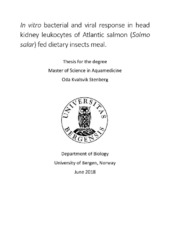In vitro bacterial and viral response in head kidney leukocytes of Atlantic salmon (Salmo salar) fed dietary insects meal.
Master thesis
Permanent lenke
https://hdl.handle.net/1956/17767Utgivelsesdato
2018-06-07Metadata
Vis full innførselSamlinger
Sammendrag
With the fast growth of today’s aquaculture industry, the demand for aqua-feeds is expanding dramatically. Insects, which are part of the natural diet of salmonids, could represent a sustainable ingredient for aquaculture feed. The aim of the current study was to test how a partial or total replacement of dietary fishmeal with insect meal affect gene responses involved in inflammation and signaling pathways in Atlantic salmon (Salmo salar) head kidney leukocytes after exposure to bacterial or viral mimics. Insect meal (IM) was produced from black solider fly (BSF, Hermetia illucens) larvae. Seawater Atlantic salmon were fed three different diets; a control diet (IM-0, protein from fishmeal and plant based ingredients (25:75) and lipid from fish oil and vegetable oil (33:66); IM-66 and IM100 diets, where 66 and 100% of fishmeal protein was replaced with IM, respectively. Leukocytes were isolated from the head kidney of fish from the three dietary groups (2 fish per cage, 3 cages per treatment, and 18 fish in total). Isolated leukocytes were seeded into culture wells and added bacterial mimic lipopolysaccharide (LPS) or viral mimic polyinosinic acid: polycytidylic acid (poly I: C) to induce an inflammatory response. Controls (Control) without LPS and poly I: C were included. The transcription of interleukins IL-1β, IL-8, IL-10 and TNF-1β was elevated in LPS treated leukocytes isolated from the three dietary groups, which confirmed the suitability of the in vitro model in this experiment. The inflammatory related gene expression was not affected by the experimental diets. The gene expression of the fish specific toll-like receptor (TLR22) and transcription factor T CCAAT/enhancer-binding protein β (C/EBP-β) was down regulated by poly I: C in all diets and by LPS treatment in cells isolated from salmon fed insect-based diets. Similarly, the leukocytes challenged with LPS and isolated from fish fed with IM-66 and IM100 had lower gene expression of all selected antioxidant enzymes (SOD and GPx1) and heat shock proteins (HSP27 and HSP 70) compared to the control diet (IM-0). The diets did not affect Prostaglandin D and E synthase (PTGDS, PTGES) transcription, but insect-based diet did lower the gene expression of arachidonate 5-lipoxygenase (5-LOX). These results suggest that replacement of fishmeal with IM in the diets of Atlantic salmon had no effect on the transcription of pro-inflammatory genes in the head kidney cells. In addition, fish fed with IM had down regulated transcription of antioxidant and stress related genes.
